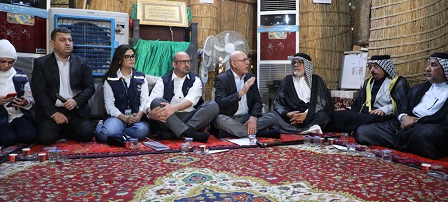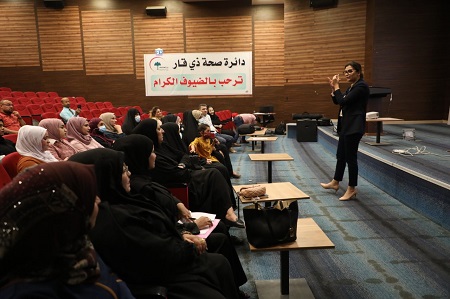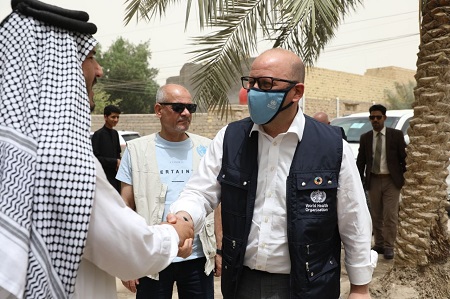 WHO and Ministry of Health conduct mission to Dhi Qar governorate to assess preparedness and response efforts to the outbreak23 May 2022 – The World Health Organization (WHO), in cooperation with the Ministry of Health in Iraq, is scaling up preparedness and response activities to control the Crimean-Congo haemorrhagic fever outbreak in Iraq.
WHO and Ministry of Health conduct mission to Dhi Qar governorate to assess preparedness and response efforts to the outbreak23 May 2022 – The World Health Organization (WHO), in cooperation with the Ministry of Health in Iraq, is scaling up preparedness and response activities to control the Crimean-Congo haemorrhagic fever outbreak in Iraq.
As of 22 May 2022, Iraq reported 97 laboratory-confirmed cases and 18 deaths, with Thi Qar governorate reporting more than 50% of the cases. Currently, all Iraqi governorates have reported cases.
Further coordination between the Ministry of Agriculture and the Ministry of Health is under way to make a difference in controlling the outbreak.
“WHO is working closely with partners to enhance surveillance and outbreak response interventions in all affected areas. We are hoping to educate the population and those working closely with animals and livestock to raise their awareness of the disease, reduce their exposure to the virus and prevent further transmission,” said Dr Ahmed Zouiten, WHO Representative in Iraq.
“The different meetings and field missions we have conducted so far allowed us to interact with different spectrums of society and identify the gaps to be bridged, especially in view of the approaching Eid Al-Adha festival, where communities come into close contact with animals, including potentially risky animals.”
Emergency response activities
WHO is working closely with the Ministry of Health to build up and deploy joint rapid response teams from the health and agriculture sectors to implement a practical strategy for the treatment of animals. WHO also aims to strengthen the diagnostic capacity of hospitals, train health workers to strengthen their capacity for adequate case management, and enhance epidemiological investigation and surveillance to detect and respond to cases as early as possible, as this increases the chances of survival. In addition, WHO and the Ministry of Health have scaled up risk communication and community engagement activities to raise the awareness of the general public and target vulnerable groups and communities.
 Awareness-raising session in Dhi Qar governorate focused on the best household practices to control the transmission of Crimean-Congo haemorrhagic fever at the household levelWHO and the Ministry have conducted a mission to Dhi Qar governorate to assess preparedness and response efforts to the outbreak. The mission conducted different meetings and sessions with health officials and workers, community leaders and women in the governorate to discuss health needs and gaps in responding to Crimean-Congo haemorrhagic fever and boost coordination to ensure greater engagement at all levels. Other governorates will also benefit from WHO and Ministry support.
Awareness-raising session in Dhi Qar governorate focused on the best household practices to control the transmission of Crimean-Congo haemorrhagic fever at the household levelWHO and the Ministry have conducted a mission to Dhi Qar governorate to assess preparedness and response efforts to the outbreak. The mission conducted different meetings and sessions with health officials and workers, community leaders and women in the governorate to discuss health needs and gaps in responding to Crimean-Congo haemorrhagic fever and boost coordination to ensure greater engagement at all levels. Other governorates will also benefit from WHO and Ministry support.
To strengthen the capacity of laboratories in other governorates, WHO has started the process of procurement of essential laboratory supplies to ensure continuity of Crimean-Congo haemorrhagic fever testing.
Community engagement
WHO, in coordination with the Ministry, has so far conducted 3 health education sessions targeting 200 community members, including religious/tribal leaders, women, health workers and butchers, to equip them with the correct information on Crimean-Congo haemorrhagic fever and mobilize them to spread the acquired knowledge among their communities.
Fifty women were engaged during the session, focusing on the best household practices to control the transmission of disease at the household level, while 50 community leaders and butchers were updated on health-related concerns regarding livestock trading and freshly slaughtered livestock. Twenty health workers were also sensitized to the incidence of the disease, the number of ticks in the environment, and the influence of climatic factors and geographical conditions.
 WHO paid a field visit to Al-Fhood township in Thi Qar to discuss with community leaders the priority interventions to lower transmission and prevent further spread of the diseaseIn addition, WHO and the Ministry of Health paid a field visit to Al-Fhood township in Thi-Qar to discuss with community leaders the priority interventions to lower transmission and prevent further spread of the disease.
WHO paid a field visit to Al-Fhood township in Thi Qar to discuss with community leaders the priority interventions to lower transmission and prevent further spread of the diseaseIn addition, WHO and the Ministry of Health paid a field visit to Al-Fhood township in Thi-Qar to discuss with community leaders the priority interventions to lower transmission and prevent further spread of the disease.




